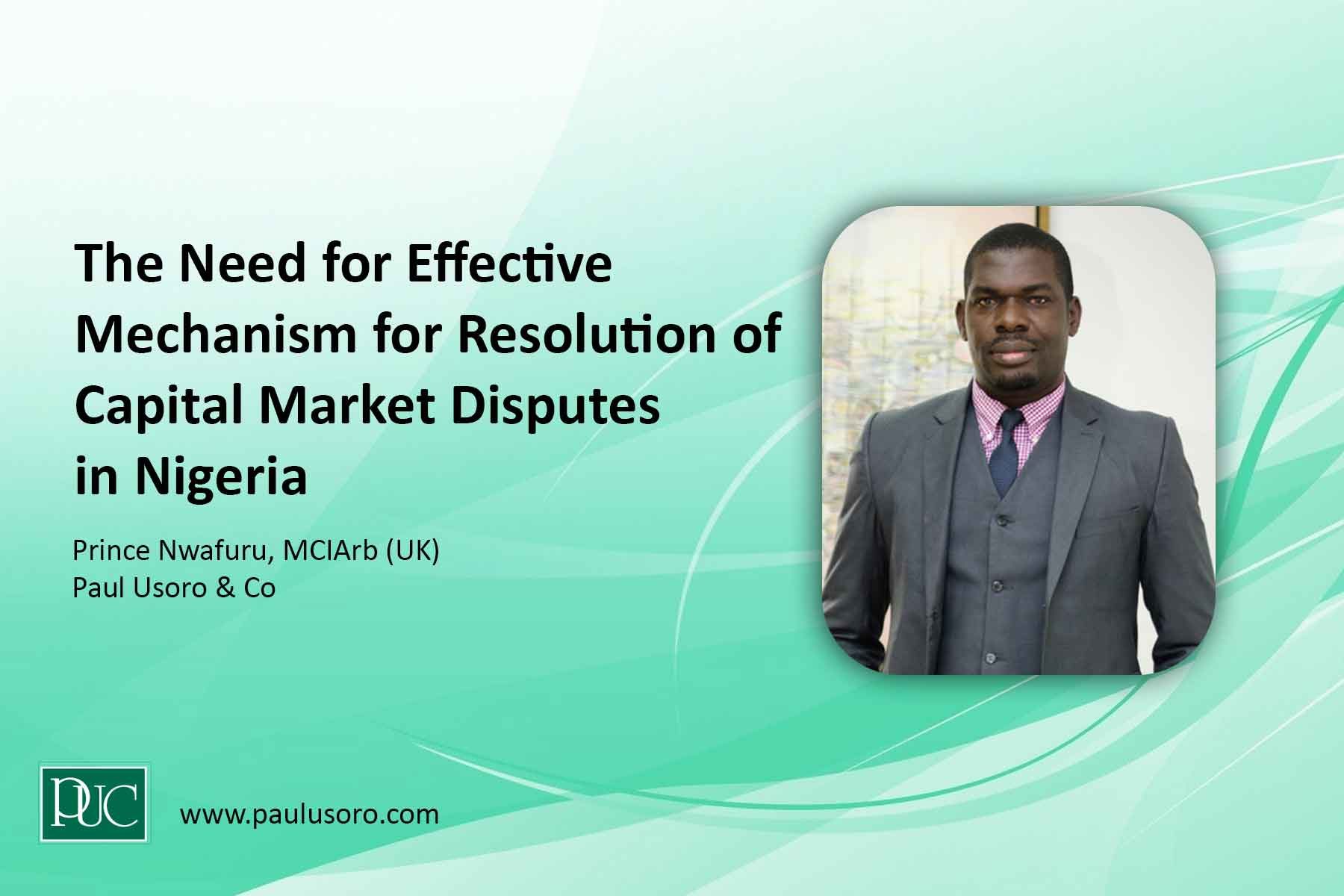Introduction
The Nigerian capital market has continued to play a critical role in the economy not only as a source of capital for private and public sectors but also avenues for long and short-term investments through equity, debt, and other innovative products. Some of the market offerings which are inherently complex serve as corporate risk management tools providing the needed liquidity on the bourse. The interactions amongst the stakeholders – investors, operators, issuers and regulators, often lead to contestation, hence the need for a vibrant and effective Dispute Settlement Mechanism (“DSM”). There is a correlation between an effective DSM and heightened investors’ confidence. Capital market disputes though generally in the genre of contracts and torts are however, specialized in nature and as such require industry knowledge for effective resolution. Globally, the effectiveness of a specialized DSM for resolution of commercial disputes is often measured with the 3 E’s which are:
(i) Efficiency – This relates to timely and cost-effective resolution that caters to the commercial interests of the parties and at the same time ensuring that parties are given equal and adequate opportunities to present their cases.
(ii) Expertise – In the traditional court system, judges are expected to decide all types of disputes ranging from commercial, criminal, general civil and political cases. On the other hand, the attraction of specialized DSM is the use of experts with industry knowledge to resolve disputes. This informed part of the recommendations of Odife Panel of 1996 for the establishment of a specialized tribunal for the resolution of capital market disputes in Nigeria.
(iii) Enforceability – A seamless enforcement process is necessary without which the outcome of such DSM becomes an empty promise that offers the winning party pyrrhic victory without remedy.
Dispute Settlement Mechanism in the Nigerian Capital Market
The Securities and Exchange Commission (“SEC”) is generally the first port of call for resolution of capital market disputes through the instrumentality of the Administrative Proceedings Committee (“APC”). The Nigerian Stock Exchange and the FMDQ also play complementary roles in this regard by providing particularly in the case of the former, an internal DSM, which investors are encouraged to explore before litigation. Section 284 of the Investments and Securities Act, 2007 (“ISA”) provides for the exclusive jurisdiction of the Investments and Securities Tribunal (“IST”) over capital market disputes. In real sense, the IST generally exercises appellate jurisdiction over any question of law or dispute involving a decision of the SEC. The Supreme Court in OKOROCHA V. UBA (2018) LPELR-45122 (SC) affirmed the Court of Appeal decision which drew a distinction between the disputes arising from section 284(1) (a)(i)-(iv) and those arising from section 284(1)(b)-(f) of ISA. In relation to disputes arising from section 284(1)(a)(i)-(iv) of the ISA, the determination by the SEC/APC is a precondition before approaching the IST, whilst the disputes under section 284(1)(b)-(f) of the ISA do not require prior decision by the SEC/APC. This principle was followed in Ebong v SEC – Appeal No. CA/L/566/2011 delivered on 04 July 2017.
The exclusive jurisdiction of the IST over capital market disputes has remained a subject of controversy as litigants also approach the State and Federal High Courts to resolve some aspects of capital market disputes. This uncertainty in the DSM coupled with the issues of delay and lack of expertise continue to fuel investors’ aversion to litigation. The NSE’s internal DSM has also been criticized for having too many procedural layers which lead to delay.
Conclusion
Investors want quick resolution of disputes because their commercial interests are often at stake. They are interested in quick resolution given the time value of money often lost in protracted litigation. To address the jurisdictional hurdle, it has been suggested that the IST should be made an inferior Tribunal so that appeals should lie from the IST to the Federal High Court, similar to the system for the resolution of tax disputes. Alternatively, the Constitution should be amended to elevate the IST to a superior Court with exclusive jurisdiction to handle all capital market disputes. Constant training of judges and lawyers to handle the ever evolving and complex capital market disputes will address the manpower challenge. In the end, the need for robust regulatory framework in the capital market should be balanced with the commercial objectives of investors to have disputes resolved in a timely fashion. Similarly, the existing DSM outside litigation, should be made known to investors.
Prince Nwafuru, MCIArb (UK)
Paul Usoro & Co

One Reply to “The Need for Effective Mechanism for Resolution of Capital Market Disputes in Nigeria”